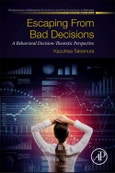Escaping from Bad Decisions presents a modern conceptual and mathematical framework of the decision-making process. By interpreting ordinal utility theory as normative analysis examined in view of rationality, it shows how decision-making under certainty, risk, and uncertainty can be better understood. It provides a critical examination of psychological models in multi-attribute decision-making, and evaluates the constitutive elements of "good" and "bad" decisions. Multi-attribute decision-making is analysed descriptively, based on the psychological model of decision-making and computer simulations of decision strategies. Finally, prescriptive examinations of multi-attribute decision-making are performed, supporting the argument that decision-making from a pluralistic perspective creates results that can help "escape" from bad decisions.
This book will be of particular interest to graduate students and early career researchers in economics, decision-theory, behavioral economics, experimental economics, psychology, cognitive sciences, and decision neurosciences.
Please Note: This is an On Demand product, delivery may take up to 11 working days after payment has been received.
Table of Contents
1. Introduction: Escaping from Bad Decisions
2. Formal Definitions of the Worst Decisions, Best Decisions, and Bad Decisions
3. Rational Choice, Irrational Choice, and Bad Decisions
4. Preference Ordering and Measurement
5. Rational Preference, Irrational Preference, and Revealed Preference
6. Multi-Attribute Decision-Making, Multi-Objective Optimization, and the Additive Conjoint System
7. A Computer Simulation of Cognitive Effort and the Accuracy of Two Stage Decision Strategies in a Multi-Attribute Decision Making Process
8. A Computer Simulation of Bad Decisions and Good Decisions: An Extended Analysis of Two Stage Decision Strategies
9. A Process Tracing Study of Decision Strategies and Bad Decisions
10. A Process Tracing Study of Bad Decisions: Using Eye Tracking in Food Decision Making
11. Decision Strategies and Bad Group Decision-Making: A Group Meeting Experiment
12. An Observational Experiment in Group Decision Making: Can People Detect Bad Group Decisions?
13. Revisiting the Group Decision-Making Experiment
14. The Detection of Bad Decisions and a Voting Experiment
15. Metacognition and the Multi-Attribute Decision-Making Process
16. The Contingent Focus Model and Bad Decisions
17. An Experiment on, and Psyschometric Analysis of, the Contingent Focus Model
18. The Situated Focus Model and its Relation to Other Theories
19. The Mental Ruler Model: Qualitative and Mathematical Representations of Contingent Judgement
20. How Attention Arises in and Influences Decision-Making
21. Escaping from Bad Decisions and Future Perspectives








